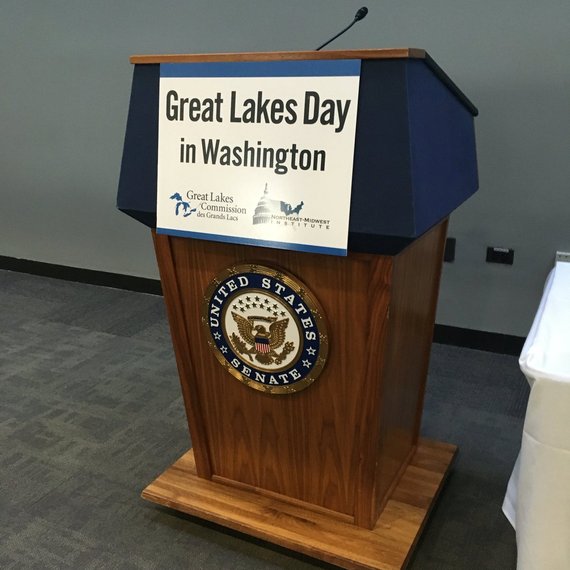Shedd Aquarium had several of our team members in Washington at the end of February, all working toward solutions for the betterment and protection of the Great Lakes. As I met with various organizations to discuss steps toward the conservation of the waters of the world, including the Great Lakes, as well as ways to improve environmental quality, my colleague Allen LaPointe attended the Great Lakes Commission Semi-annual Meeting and Great Lakes Day in Washington.
The Great Lakes Commission is an interstate agency that promotes the development and preservation of the water and resources of the Great Lakes basin and St. Lawrence River, and serves to carry out the terms and requirements of the Great Lakes Basin Compact. Comprised of more than 50 commissioners from each of the Great Lakes basin states and provinces, the Commission meets twice per year to discuss issues surrounding the Great Lakes and ways to solve them.
As the vice president of environmental quality at Shedd, Allen was well-positioned to observe the Great Lakes Commission and like-minded organizations as they discussed issues revolving the health of the Great Lakes and methods for improvement. He was also able to extend our Shedd team's appreciation for the folks who stand up for the Great Lakes and thank the Commission for their dedication to healthy waterways. Allen brought some key takeaways from their discussion back to our Great Lakes team at Shedd, allowing us to engage in conversations to find ways that we can lend to the greater good of the Great Lakes basin.
---
From Allen LaPointe, Vice President of Environmental Quality, Shedd Aquarium:
Representing Shedd Aquarium as an official observer, I was provided the opportunity to attend the Great Lakes Commission Semi-annual Meeting to hear from the Commission on key issues in the basin and their plans of resolution. Over the two-day meeting, a range of topics were discussed - nutrient loading, invasive species control, changes in government funding, etc. These three were the most important and where the bulk of the conversation took place.
The first of these three components - nutrient loading - focused on Lake Erie specifically because it has seen an extreme increase in algal blooms as a result of phosphorus and nitrogen inputs, mostly coming from agriculture. In addition to clogging river systems, algal blooms can eventually cause drinking water to turn unpalatable or even toxic - a reasonable cause for concern. The Commission noted that they plan to reduce nutrient loading (algal blooms) by 40 percent. Though the Commission is still working through specifics on how to reduce and measure nutrients, this high reduction percentage shows that the Commission isn't messing around - nutrient loading needs to be addressed.
As for issues concerning invasive species control, this is not a new topic for the Commission. Asian carp are still a looming threat and the U.S. Army Corps of Engineers provided updates on monitoring and prevention of their spread. A large part of the conversation, however, was spent on ballast water. Being that ballast water provides a means of transportation for invasive species like zebra and quagga mussels, the Commission discussed the need for regulations or treatment technologies that would prevent invasive species from hitching a ride from other bodies of water and settling in our own. As part of the list of priorities and resolutions that came from the meeting, the Commission resolved to continue investigations for a long-term solution that would prevent transfer between the Great Lakes and Mississippi river basin while simultaneously allowing industries (recreation, shipping, etc.) to reap the benefits of adjoining waterways.
Among other important topics discussed - safe drinking water, aging infrastructures and oil transportation - the last of what I would consider "big topics" was the decrease in government funding for the Great Lakes Restoration Initiative (GLRI). This year's $50 million cut in funding brought concern for the future of GLRI funding, especially considering the impending changes in administration. Nonetheless, the Commission was confident in the ability to continue restorative and preventative measures, and even listed "providing at least $300 million for the GLRI in FY 2017" among their resolutions.
Whether it was discussing invasive species or government funding, the general theme of the meeting was bipartisanship. Representative Mike Kelly from Pennsylvania noted that, "there can't be anything political about saving the Great Lakes," and the overwhelming presence of both political parties from all across the Great Lakes basin made that abundantly clear. Being that our roots are in Illinois, we appreciated the presence of Illinois Congressman Mike Quigley and representatives for Senator Mark Kirk. We commend the Commission for their work to preserve the Great Lakes and look forward to seeing more resolutions as part of their five-year strategic plan.
---
Though a large portion of these topics center around government actions, there are still roles you and I can play to help advocate for the health of the Great Lakes and support the Commission's resolutions. Help educate your peers on the value the lakes bring to us. If you're a boater, you can make sure to empty ballast water before transferring your boat from one lake to another. Or, if you're a registered voter, you can help by voting for a presidential candidate that supports the well-being of the Lakes and the people that live off of them.
If you're interested in learning more about the Great Lakes Commission's meeting resolutions, visit the Great Lakes Commission website. You can also take a look back at tweets from the meeting and the Great Lakes Day in Washington in this Storify that we've created.
Follow Roger Germann on Twitter: www.twitter.com/@Shedd_GL
